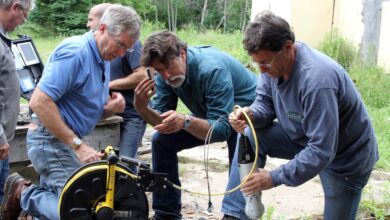Emma Culligan is The Reason Why Miriam Amirault Left The Curse Of Oak Island?
Emma Culligan is The Reason Why Miriam Amirault Left The Curse Of Oak Island?

On lot five, archaeologists Leard Nan and Helen Shelvin welcome their colleague Miriam Mamira back to the island.
This is what archaeology is about. Finding artifacts, studying them, dating them, and then weaving them into an understanding.
A story, if you will, of what happened.
This is certainly quite unique. Miriam didn’t leave. She was erased the moment Emma Culligan stepped in.
No goodbye, just silence after a strange artifact shut everything down.
When the show came back, Miriam was gone and Emma was suddenly everywhere.
The whole vibe shifted. Less truth, more flash. Like the soul got cut out.
Tune in because what forced Miriam out wasn’t chance. It was planned and signed in silence.
The quiet exits that changed the show.
Emma didn’t kick the door down or steal the spotlight on day one. She didn’t have to.
The shift happened gradually, like fog rolling in.
One episode she was there in the background, the next she was filling up the screen.
Subtle but loud enough to notice.
It was like she slipped into a space that hadn’t even been declared empty yet.
And that space—it used to be Miriam’s, but she wasn’t ready to vanish just yet.
And the team dynamics—let’s just say they weren’t the same without her.
She had a way of balancing the thrill-seeking attitude of the Lego brothers with real archaeological precision.
She’d show up calm in the chaos, brushing away more than just dirt. She cleaned up the confusion.
Viewers could tell when she was around because things made more sense.
The digging had a method, not just madness.
Her presence brought a kind of order.
Then she vanished.
They said it was due to a temporary government shutdown.
Something about a piece of ancient pottery triggering heritage protocols.
Sounds valid on the surface, but that shutdown didn’t last forever.
When the cameras rolled again, she was gone. Just missing from the crew.
Fans looked, they rewatched. They scanned episode credits and forums. Nothing.
And then, almost like a magic trick, she reappeared.
Season 10.
Archaeologists Miriam Emerald and Dr. Aaron Taylor continued to search for more evidence that might tell them which direction the mysterious stone pathway is heading.
Brief, sweet, and far too short.
That return was strange. It didn’t feel like a comeback, more like a courtesy call.
She smiled. She worked. She stayed professional.
But there was a different air about her. Distant, reserved, like someone already packing their bags.
And then she went again, this time for good.
Enter Emma. Calm, confident, and oddly well-timed.
Not just filling in gaps, but stretching into scenes that used to revolve around the one who left.
Emma began working closely with the same experts.
She took on key tasks.
She got screen time that had once been automatically given to her predecessor.
It was hard not to notice, harder not to wonder.
Fans talked, forums lit up, Reddit threads multiplied.
People started comparing styles, presence, energy.
The one who left had a softness, a focus, a kind of quiet charisma.
Emma brought clarity and precision, too.
But it wasn’t the same. It didn’t feel the same.
And the transition wasn’t smooth.
It was sudden, almost surgical.
The show has always been a revolving door. Experts step in, do their bit, and move on.
But not everyone gets remembered. She did. Her exit stuck.
And while others left quietly without raising eyebrows, her silence created noise—
especially since Emma seemed to rise just as she faded.
We are seeing some quantities of gold.
It shows gold.
Yeah, it—it’s there.
Let’s take a closer look at what really changed when Emma arrived.
It wasn’t just about tasks or digging.
The energy shifted. Team dynamics started to feel different.
Emma connected with the crew in a way that felt calculated, efficient—
less about collaboration, more about performance.
And as her presence grew, something else shrank.
The organic, curious spirit that once filled the show seemed to slip through the cracks.
This wasn’t just a swap of professionals.
It was a rewrite of tone.
The scenes got cleaner, but colder.
More polished, but less heartfelt.
Emma brought skill, no doubt—
but the warmth, that took a hit.
Of course, people tried to piece together the whereabouts of the one who disappeared.
Social media turned up nothing.
She kept a low profile, which only made her absence louder.
Speculation ran wild.
Was she pushed out?
Did she see something behind the scenes that turned her off?
Was it a competition, tension, a change in values?
There was that detail about forensics. She mentioned it on the show—
a dream to pivot into that field.
A few fans tried to track her down through college registries, academic circles, anything.
But information was scarce.
Her digital footprint practically vanished after the show.
And that silence—that careful silence—
it felt chosen.
Maybe she just didn’t want the noise anymore.
Maybe reality TV was never her final stop.
But the lack of closure, the absence of a clear goodbye left too many questions.
And with Emma stepping in like clockwork, the storyline wrote itself in people’s minds.
Episodes started to lean heavier on Emma’s insights.
Her scenes increased.
She got featured in conversations that used to lean on the one who left.
The audience had no choice but to adjust.
But adjusting doesn’t mean forgetting—
especially not in a fandom this invested.
The real kicker?
Emma was good.
Maybe too good.
She hit her marks, stayed on message, and never rocked the boat.
The perfect post-departure fit.
But perfection can be suspicious.
It smooths out all the rough edges—
and rough edges are what make people real.
The one who came before had them.
Emma? Not as much.
There’s also the question of how much control the producers had.
Was the one who left seen as too independent? Too unpredictable?
Maybe she didn’t want to play along with the show’s tighter scripts or curated drama.
Maybe she questioned choices.
Maybe she refused to smile on cue.
That’s the kind of authenticity that doesn’t always mix well with network television.
And then there’s the simpler, colder theory—
Maybe she was just outshined.
Not because she lacked skill, but because someone else aligned better with the vision the showrunners wanted.
A vision of predictability, of structure, of tidy narratives that wrap up nicely at the end of the hour.
But fans don’t forget energy.
They remember the way someone made a moment feel.
And the one who came before brought feelings.
Emma brought facts.
It’s not a crime, but it’s not the same.








